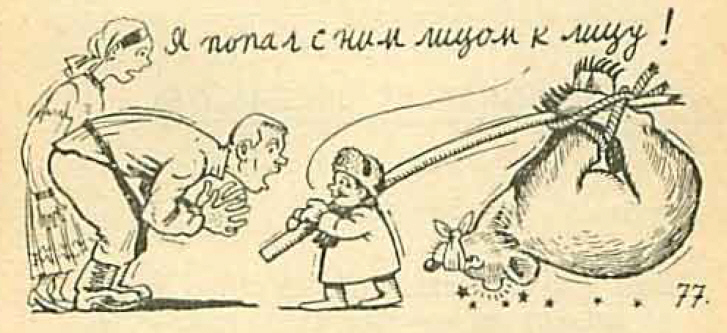
|
Languages
|
| Russian for English speakers 77 |
 |
| Lesson 77 |
|
296 |
Russian |
English Английский |
|
Семьдесят седьмой урок (77-й) урок |
Seventy seventh lesson |
|
|
УРОК НОМЕР СЕМЬДЕСЯТ СЕМЬ (№77) |
Lesson number seventy seven (#77) |
| ПОВТОРЕНИЕ И ЗАМЕТКИ |
| 1 Among the verbs which entirely differ in the
imperfective and perfective, let us recall : брать(imp.), to take (я беру, он берёт, они берут; past : я/он брал, они брали) взять (perf.), to take (возьму, возьмёт, возьмут; past : взял) and класть (imp.), to put (кладу, кладёт, кладут, I put, he put, they put; past : клал). положить (perf.) : to put (положу, положит, положат, I shall put, he will put, they shall put ; past : положил) Others have the reflective form only in the imperfective : e.g.: Садиться (imp.) : to sit down (сажусь, садится, садятся, I sit down, he sits down, they sit down; past : садился) ; and in the perfective : сесть: to sit down (сяду, сядет, сядут, I shall sit down, he will sit down, they will sit down; past : сел). or again : ложиться (imp.), to lie down (ложусь, ложится, ложатся, I lie down, he lies down, they lie down: past : я/он ложился, они ложились), and in the perfective : лечь, to lie down (лягу, ляжет, лягут: I shall lie down, he will lie down, they will lie down ; past : я лёг) |
| 2 With садиться (imp.),
сесть (perf.), we find сидеть
(imp.) : to sit, be sitting, (сижу, сидит, сидят,
I sit, he sits, they sit; past : сидел) and the
perfectives : посидеть, to sit awhile, and
присесть, to sit down a little. Посидите немножко: remain seated awhile. Я присяду на минуту: I shall sit down a little. |
| (3) Спасибо: thank you, is
formed with спаси бог, God save...! Спасаться, спасать (imp.), to save (спасаю, спасает, спасают; past : спасал), спасти (perf.), to save (спасу, спасёт, спасут, past : спасал) Я спасся, (infinitive спастись) благодаря темноте: I escaped thanks to the darkness. Спасайся (infin. спасаться) кто может! : Every man for himself! |
| 4 The root след gives : Следовать (imp.) : идти за: to follow (следую, следует, следуют; past : следовал) ; perfective : последовать. Следуйте за ним: идите за ним: follow him... Из этого следует, что... : Hence [from this] it follows that... — Следует is used for нужно: must. Не следует торопиться: one must not hurry. — Сколько с меня следует? How much do I owe? [Liter : how much from me is necessary?]. Следовательно: accordingly. Следователь: examining magistrate. Следить (imp.) (слежу, следит, следят, past : следил), means to follow figuratively, i.e., to spy, also to track (police). Следите за ними: Keep an eye on them. Я послежу за тем, чтобы: I shall see to it, that... След, следы - track, traces. — Я пойду по его следам : I shall follow his tracks. Последний : the last. Следующий: the following. |
| 5 Стать (perf.), to become,
begin to. (Стану, станет, станут; past : стал). Он когда станет работать? : When will he start working? Я стал привыкать к России : I have begun to get used to Russia. But не стать is a synonym of перестать, to cease. Я не стал ходить в школу: I have stopped going to school; and sometimes стать means : to stop : машина стала : the machine stopped; река стала : the river is frozen. We also see : стать на колени, to kneel; стать на стул: to climb on a chair... etc... Это стало двадцать рублей: it cost 20 roubles. Во что бы то ни стало : cost what it may. Этого с меня станет (or хватит) : This is sufficient for me. The imperfective is становиться: to become (становлюсь, становится, становятся). Он становится злым: he becomes angry |
| б Лицо, plural
лица is the face or the person, personage. — У неё хорошенькое лицо: she has a pretty lace. — Он - важное лицо: he is an important personage. — Частное лицо : a private person. Я Личный: personal. — Это мои личные дела: This is my personal business. Я хочу его лично видеть: I want to see him personally. Хватать (imp.) (хватаю, хватает, хватают; past : хватал); хватить (perf.) (хвачу, хватить, хватят; past : хватил): to seize or to suffice. Она хватала всё что могла: she would catch all that she could. With the meaning of : to seize, схватить is more frequently used, in the perfective, than хватить. Он схватил меня за руку: he seized me by the
arm (or hand). |